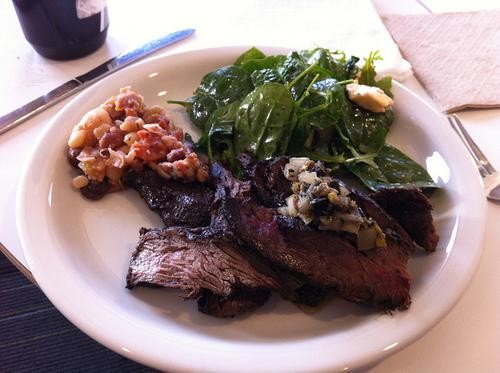What You Should Know About The Paleo Diet Trend

More athletes are trying the meat- and produce-packed diet, claiming improved health and running. Should you switch?
By Kelly Bastone, Runner’s WorldPhoto by sbshine/Flickr
If a diet promised to help you
lose weight, feel energized, and dodge colds and flu, would you try it?
What if you had to give up pasta, bagels, and oatmeal? Carbs may be
staples for many runners, but they are one of the restrictions in the
Paleo diet, which advocates a model of eating based on prehistoric
humans’ diets. A growing number of runners have joined its ranks. But is
it good for you?
Related: How the Paleo Diet Affects Your Lipid Levels
Related: How the Paleo Diet Affects Your Lipid Levels
"Paleo has a lot of very good
things going for it," says Heather Mangieri, M.S., R.D., spokesperson
for the Academy of Nutrition and Dietetics. The program excludes
processed foods and refined sugars and emphasizes vegetables, fruits,
nuts, and grass-fed meat. All good. "We know diets rich in fruits and
vegetables fight heart disease and certain cancers," says Mangieri.
Grass-fed meat has a healthier fat ratio than grain-fed, and all meat
provides amino acids that speed recovery. A few months after adopting a
Paleo diet, ultrarunner Timothy Olson set a new course record at the
2012 Western States 100-Mile Endurance Run. "My legs are less swollen
after really long runs," says Olson. "I can go hard again sooner than I
did before I went Paleo."
But the Paleo diet also
eliminates grains and legumes (both key carb sources for runners), as
well as dairy, alcohol, salt, and vegetable oils. Paleo protagonists,
such as researcher Loren Cordain, Ph.D., coauthor of The Paleo Diet for
Athletes, say that these foods raise your body’s acid levels and leach
minerals from your bones. Cordain cites substances within those foods
(phytates in whole grains and lectins in beans) that inhibit nutrient
absorption. But Mangieri disagrees: “Nutrient loss is minimal,” she
says, “and it doesn’t seem to cause deficiencies.” She points to
Mediterranean populations that enjoy long life and little chronic
disease with a diet rich in grains and legumes.(See what a day of eating
like cavemen is really like, here.)
The diet’s emphasis on eating
high amounts of meat is also concerning, says Matt Fitzgerald, a
certified sports nutritionist, running coach, and author of the new book
Diet Cults, which explores why certain diets take root in our culture. A
2012 study by the Harvard School of Public Health found that the more
red meat people eat, the higher their mortality rate. “I would encourage
runners interested in the Paleo diet to eat more fish and poultry and
less red meat—and as little processed meat as possible” he says.
Related: The Best Diet for Your Fitness Goals
Комментариев нет:
Отправить комментарий